Ministers said to be planning to legislate against the devices because of concerns about children’s health
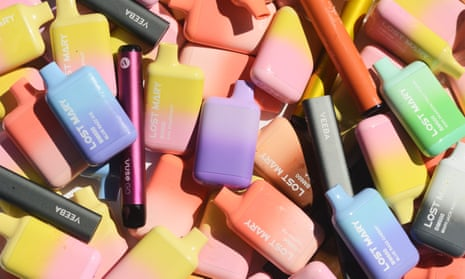
Leading doctors and councils have welcomed reports that ministers are preparing to ban single-use vapes in the UK, but others have expressed fears a ban could lead to a “flood” of illegal products on the market.
The reports of plans to stop the sale of disposable e-cigarettes come as fears grow about their environment impact and the health risks they pose to the large number of teenagers taking up vaping.
An announcement from the government is expected soon after it concluded that single-use vapes are aimed at children.
David Fothergill, chair of the Local Government Association’s community wellbeing board, said the association was “very pleased” about news of the proposed ban.
He said: “Single-use vapes blight our streets as litter, are a hazard in our bin lorries, are expensive and difficult to deal with in our recycling centres. It is important that a ban is brought in at pace. Disposable vapes are an inherently unsustainable product.”
Steve Turner, registrar for the Royal College of Paediatrics and Child Health, agreed. He said his colleagues across the British Isles were “really worried” about young people vaping and the fact it was an “effective entry into nicotine addiction and smoking”.
The situation was “a public health disaster” and “children should not be becoming addicted to nicotine”, he said. He added that, if not a ban, then e-cigarettes should be concealed in shops and “sold under the same conditions that all other nicotine products”.
However, Scott Butler, executive director at Material Focus, an environmental charity, is worried that a ban could lead to “hard to control illegal sales and an established illegal vape market”. He said: “If the legitimate industry is banned, then there will be no mechanism to deal with all the operational challenges and costs of illegally sold vapes which have the same challenges.”
Last week Material Focus research found that 5m single-use vapes are being thrown away in the UK every week, a fourfold increase on 2022. Butler said that if the market went underground there would be no way to encourage retailers to recycle these products.
Illegal vapes are already a big issue. In June the Guardian revealed that millions of illegal and potentially harmful vapes have been seized in the past three years, with trading standards saying this was the “tip of the iceberg”.
Andrej Kuttruf, chief executive of the vape shop Evapo, said a ban would be “bad news for all smokers”. Instead there should be more “controls and limits” around “access for kids” and a proper licensing scheme to dictate who could sell vapes.
“Right now there is no enforcement at all, and that is why children are buying them, no one is policing them,” he said. “The government let it get completely out of control and a kneejerk reaction of a ban will help the black market to thrive and products will be unregulated and uncontrolled.”
John Dunne, director general of the UK Vaping Industry Association, said it was important to point out that this was “about a consultation” and “that no decisions have been made on the future of disposable vapes”. He said a ban was “not the answer”, adding: “Disposables have proved to be highly effective in helping smokers quit their habits.”
He added that vape bans “lead to black markets in the sale of such products and increased smoking rates, putting smokers and vapers at significantly more risk of harm across the world”.
The Department of Health and Social Care said: “We are concerned about the rise in youth vaping and the environmental impacts of disposable vapes. That is why we launched a call for evidence to identify opportunities to reduce the number of children accessing and using vaping products – and explore where the government can go further. We will set out our response in due course.”

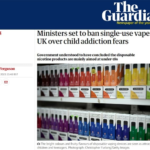
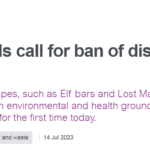
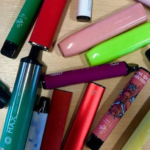
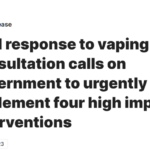
Gii thiu binance
Can you be more specific about the content of your article? After reading it, I still have some doubts. Hope you can help me.
binance Registrera dig
Your point of view caught my eye and was very interesting. Thanks. I have a question for you.
Bernard Serra
I just couldn’t depart your site prior to suggesting that I really enjoyed the standard information a person provide for your visitors? Is gonna be back often in order to check up on new posts
Tonicgreens reviews
Thanks for sharing excellent informations. Your site is so cool. I’m impressed by the details that you have on this blog. It reveals how nicely you understand this subject. Bookmarked this website page, will come back for more articles. You, my pal, ROCK! I found simply the info I already searched everywhere and just couldn’t come across. What a perfect site.
leanbiome reviews
What Is LeanBiome? LeanBiome, a new weight loss solution, includes beneficial strains of gut bacteria that work fast for weight loss.
java burn reviews
What is Java Burn? Java Burn is a unique and innovative product that enhances your morning coffee routine.
Tonic Greens
Normally I don’t learn article on blogs, but I wish to say that this write-up very forced me to take a look at and do it! Your writing taste has been amazed me. Thanks, quite nice post.
Sugar defender reviews
F*ckin’ amazing things here. I’m very satisfied to peer your article. Thank you so much and i’m having a look ahead to contact you. Will you please drop me a e-mail?
you can try this out
My programmer is trying to persuade me to move to .net from PHP. I have always disliked the idea because of the costs. But he’s tryiong none the less. I’ve been using Movable-type on a variety of websites for about a year and am nervous about switching to another platform. I have heard excellent things about blogengine.net. Is there a way I can transfer all my wordpress content into it? Any help would be really appreciated!
Alpha X10nd Ultra
I really appreciate this post. I have been looking all over for this! Thank goodness I found it on Bing. You’ve made my day! Thanks again
Pronerve 6
Thanks for a marvelous posting! I seriously enjoyed reading it, you may be a great author.I will be sure to bookmark your blog and definitely will come back down the road. I want to encourage you to ultimately continue your great job, have a nice afternoon!
get more info
Great – I should certainly pronounce, impressed with your website. I had no trouble navigating through all the tabs as well as related info ended up being truly simple to do to access. I recently found what I hoped for before you know it in the least. Quite unusual. Is likely to appreciate it for those who add forums or something, site theme . a tones way for your customer to communicate. Nice task..
Glucotrust Reviews
Hello There. I found your weblog using msn. This is an extremely well written article. I’ll be sure to bookmark it and come back to learn more of your useful info. Thanks for the post. I will certainly comeback.
cbd bestellen
Valuable info. Lucky me I found your site by accident, and I’m shocked why this accident didn’t happened earlier! I bookmarked it.
Java Burn review
That is really interesting, You’re an excessively professional blogger. I’ve joined your rss feed and stay up for looking for more of your magnificent post. Also, I have shared your web site in my social networks!
cbd switzerland
I like the helpful info you provide in your articles. I’ll bookmark your weblog and check again here frequently. I’m quite certain I’ll learn many new stuff right here! Good luck for the next!
renew
What is Renew? Renew is a dietary supplement designed to support blood flow while also aiming to boost testosterone levels and provide an explosive energy drive
Kerassentials reviews
I like this web site so much, bookmarked. “American soldiers must be turned into lambs and eating them is tolerated.” by Muammar Qaddafi.
cbd shop france
Does your site have a contact page? I’m having problems locating it but, I’d like to send you an e-mail. I’ve got some recommendations for your blog you might be interested in hearing. Either way, great website and I look forward to seeing it expand over time.
Java Burn
Only wanna comment on few general things, The website style and design is perfect, the content is rattling excellent : D.
Fitspresso
Awsome website! I am loving it!! Will come back again. I am taking your feeds also.
The Genius Wave
You made some nice points there. I looked on the internet for the issue and found most individuals will agree with your blog.
SeroLean
A large percentage of of the things you point out is supprisingly appropriate and that makes me ponder the reason why I had not looked at this in this light previously. This article truly did switch the light on for me personally as far as this subject goes. Nonetheless there is 1 factor I am not really too cozy with and while I attempt to reconcile that with the actual main theme of the position, allow me observe what all the rest of your visitors have to say.Well done.
hire a hacker for cell phone
Thank you for any other informative web site. Where else could I am getting that type of info written in such a perfect method? I’ve a challenge that I’m just now running on, and I have been on the look out for such information.
puravive reviews
Thank you for every other informative website. Where else may just I get that kind of information written in such an ideal method? I have a undertaking that I’m just now operating on, and I’ve been on the look out for such info.
balmorex pro review
great publish, very informative. I wonder why the other specialists of this sector do not realize this. You must proceed your writing. I am sure, you’ve a great readers’ base already!
Sumatra slim belly tonic review
Some really good blog posts on this site, thanks for contribution.
The Genius Wave
Hi there! This post couldn’t be written any better! Reading through this post reminds me of my previous room mate! He always kept talking about this. I will forward this article to him. Pretty sure he will have a good read. Thank you for sharing!
zeneara review
After study a few of the blog posts on your website now, and I truly like your way of blogging. I bookmarked it to my bookmark website list and will be checking back soon. Pls check out my web site as well and let me know what you think.
Oriental Blue Tonic
I’m really impressed with your writing skills as well as with the layout on your blog. Is this a paid theme or did you modify it yourself? Anyway keep up the nice quality writing, it’s rare to see a great blog like this one today..
Trustinvest.ca
Great ?V I should definitely pronounce, impressed with your web site. I had no trouble navigating through all the tabs and related information ended up being truly simple to do to access. I recently found what I hoped for before you know it at all. Quite unusual. Is likely to appreciate it for those who add forums or anything, web site theme . a tones way for your customer to communicate. Nice task..
java burn reviews
What Is Java Burn? Java Burn is a natural health supplement that is formulated using clinically backed ingredients that promote healthy weight loss.
leanbiome
What Is LeanBiome? LeanBiome is a natural dietary supplement that promotes healthy weight loss.
ikaria lean belly juice review
This really answered my problem, thank you!
cbd tropfen kaufen
Hi there very nice website!! Man .. Excellent .. Amazing .. I’ll bookmark your web site and take the feeds also?KI am glad to find numerous useful info here within the put up, we need work out extra techniques on this regard, thank you for sharing. . . . . .
CogniCare pro reviews
This web site is really a walk-through for all of the info you wanted about this and didn’t know who to ask. Glimpse here, and you’ll definitely discover it.
Java Burn
Im no longer sure the place you are getting your info, however great topic. I needs to spend some time finding out more or figuring out more. Thank you for wonderful info I was on the lookout for this info for my mission.
read full report
I likewise conceive therefore, perfectly pent post! .
Lottery Defeater
obviously like your web-site but you need to check the spelling on quite a few of your posts. A number of them are rife with spelling issues and I in finding it very troublesome to inform the truth nevertheless I?¦ll definitely come back again.
Javaburn reviews
Thanks for the good writeup. It in fact was once a entertainment account it. Glance complex to more brought agreeable from you! However, how could we keep in touch?
Java Burn
I conceive this internet site has some real good information for everyone. “As we grow oldthe beauty steals inward.” by Ralph Waldo Emerson.
sugar defender review
As I website possessor I conceive the written content here is real superb, regards for your efforts.
Prodentim
There is noticeably a bunch to know about this. I believe you made certain nice points in features also.
Binance 註冊
I don’t think the title of your article matches the content lol. Just kidding, mainly because I had some doubts after reading the article.
Java Burn reviews
I used to be suggested this website by my cousin. I’m not sure whether or not this submit is written by way of him as no one else recognise such distinct about my trouble. You’re incredible! Thank you!
Fitspresso review
I used to be very pleased to seek out this net-site.I wanted to thanks in your time for this excellent read!! I positively having fun with each little bit of it and I have you bookmarked to take a look at new stuff you weblog post.
Fitspresso Reviews
I¦ll right away clutch your rss feed as I can’t in finding your email subscription link or e-newsletter service. Do you’ve any? Kindly let me know in order that I may subscribe. Thanks.
Mixed Cannabinoid Gummies
I love your blog.. very nice colors & theme. Did you create this website yourself? Plz reply back as I’m looking to create my own blog and would like to know wheere u got this from. thanks
cbd trim
Hi, i believe that i noticed you visited my weblog so i got here to “return the choose”.I am attempting to to find issues to enhance my web site!I suppose its ok to use a few of your concepts!!
vente de cbd
Some really nice and useful info on this site, likewise I believe the pattern holds fantastic features.
binance
Thank you for your sharing. I am worried that I lack creative ideas. It is your article that makes me full of hope. Thank you. But, I have a question, can you help me?
Sugar Defender
Howdy! This is kind of off topic but I need some help from an established blog. Is it very difficult to set up your own blog? I’m not very techincal but I can figure things out pretty fast. I’m thinking about setting up my own but I’m not sure where to begin. Do you have any points or suggestions? Many thanks
fiscale advocaat
I have been exploring for a bit for any high quality articles or blog posts in this sort of space . Exploring in Yahoo I eventually stumbled upon this website. Studying this info So i am satisfied to exhibit that I have a very good uncanny feeling I came upon exactly what I needed. I so much no doubt will make sure to don¦t put out of your mind this web site and give it a look regularly.
Daftar di Binance
Thanks for sharing. I read many of your blog posts, cool, your blog is very good.
tonic greens
I went over this site and I think you have a lot of superb info , saved to bookmarks (:.
Dentavim reviews
What¦s Taking place i’m new to this, I stumbled upon this I have discovered It absolutely useful and it has aided me out loads. I’m hoping to contribute & aid other users like its helped me. Good job.
Cellucare
so much superb info on here, : D.
Vytvorit osobn'y úcet
Your article helped me a lot, is there any more related content? Thanks! https://accounts.binance.com/bn/register?ref=UM6SMJM3
binance registrering
I don’t think the title of your article matches the content lol. Just kidding, mainly because I had some doubts after reading the article.
Бонус за регистрацию в binance
Thanks for sharing. I read many of your blog posts, cool, your blog is very good.
binance
I don’t think the title of your article matches the content lol. Just kidding, mainly because I had some doubts after reading the article.